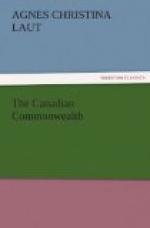“His Royal Highness has arrived! His Royal Highness has arrived,” gasped the little secretary, almost apoplectic with self-importance. “Come and help to get the baggage off—”
“You go to ——,” answered the khaki-uniformed trooper, aiming a tobacco wad that flew past the little secretary’s ear. “Get the baggage off yourself! We’re not here as porters. We’re here to execute orders and we don’t take ’em from little damphool fussies like you.”
Yet that trooper was of the company that made the Strathcona Horse famous in South Africa—famous for such daring abandon in their charges that the men could hardly be held within bounds of official orders. He is of the very class of men who have forsaken gainful occupations in the West to clamor a hundred-thousand strong for the privilege of fighting to the last ditch for the empire under the rain of death from German fire.
“How can Canadians be loyal to a system of government that acknowledges some fat king sitting on a throne chair like a mummy as ruler?” demanded an American woman of a Canadian man.
“Well,” answered the Canadian, “I don’t know that any ‘fat king’ was ever quite so fat as a gentleman named Mammon who plays a pretty big part in the government of all republics.” He drew a five-dollar bill from his pocket. “As a piece of paper that is utterly worthless,” he explained. “It isn’t even good wrapping paper. It’s a promise to pay—to deliver the goods, that gives it value. It’s what the system of government stands for, that rouses support—not this, that, or the other man—”
“But what does it stand for?” interrupted the American; and the Canadian couldn’t answer. It roused and held his loyalty as if of family ties. Yet he could not define it.
He might have explained that Canada has had a system of justice since 1837 never truckled to nor trafficked in, but he knew in his heart that the loyalty was to a something deeper than that. He knew that many republics—Switzerland, for instance—have as impartial a system of justice. He might have descanted on the British North America Act being to Canada what the Constitution is to the United States, only more elastic, more susceptible to growth and changing conditions; but he knew that the Constitution was what it was owing to this other principle of which law and justice were but the visible formula. He might easily have dilated on excellent features of the Canadian parliamentary system different from the United States or Germany. For instance, no party can hold office one day after it lacks the support of a majority vote. It must resign reins to the other party, or go to the country for re-election. Or he might have pointed to the very excellent feature of Cabinet Ministers sitting in the House and being directly responsible to Commons and Senate for the management of their departments to the expenditure of a farthing. A Cabinet member who may be quizzed




